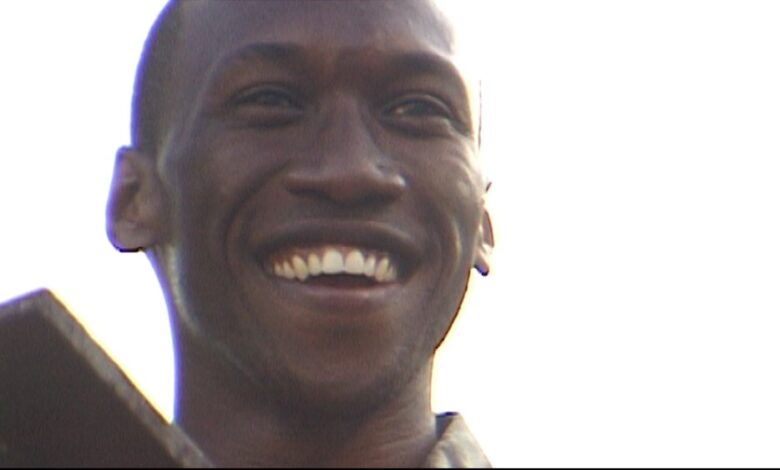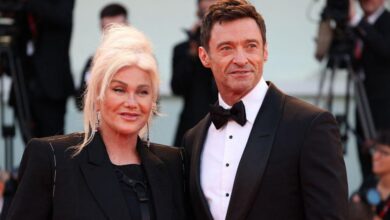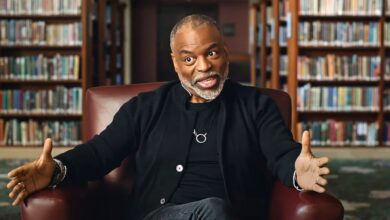Mahershala Ali’s 2001 film ‘Taste the Revolution’ finally premieres

Every director would love to rope in Mahershala Ali for his film. Now imagine getting the two-time Oscar winner for your first feature film. That’s what happened to Daniel Klein in 2000 when he hired the young actor to star in his film, which was never released or even formally presented beyond screenings at a small regional film festival. But now, nearly 25 years later, a new film from the countless hours of footage will take the spotlight when “Taste the Revolution” premieres Oct. 19 at the New Orleans Film Festival. The film is also looking for distribution.
“It’s a strange thing to experience, and I’m very happy that the public will get the chance to see it,” says Ali. Variety. “It was like a ghost limb in my life – something that you know is there, something that I experienced and was really moved by creating and being a part of. It just never met its audience.
Presented in documentary style, “Taste the Revolution” is about a film crew that follows a charismatic leader named Mac Laslow (Ali) as he organizes a movement for disillusioned youth. What exactly they’re angry about (or protesting) becomes secondary to an excuse to throw an outdoor festival on a borrowed estate, while Mac’s own motives are called into question. It’s both hilarious and sobering – and even though it was recorded decades ago, it couldn’t feel more current. And it features a standout turn from Ali, who has also signed on as executive producer, that foreshadows his spectacular career.
Timing was one of the reasons the film was shelved. The original script was written by Klein and co-writers Brandon Krueger and Colin Trevorrow. Yes, that’s the same Trevorrow who went on to direct ‘Safety Not Guaranteed’ and ‘Jurassic World’ and not only serves as an EP in the film, but also plays one of the activists. Their original film was very different – not mockumentary style and with completely different storylines – and was titled ‘Making Revolution’.
Klein doesn’t mince words when he talks about why that film was never released. “It was embarrassing,” he says. “We had no money to rework it and it didn’t make any sense. It was a mess.” Moreover, times changed radically after the terrorist attacks of September 11, 2001. “It immediately turned the film into a period piece,” he notes. It was also a comedy with a scene where Ali’s character had a bomb strapped to his chest. “It felt off-putting and tone-deaf and just inappropriate,” he says.
Klein doesn’t think about the time and money he put into the project and says, ‘What have I lost? I lost some years on a movie, but in the scheme of things there was so much more at stake.”
Echoes Ali: “It was like a pain that you just learned to live with. I spoke about it from time to time and am still very proud of the work in my mind. But I had let it go.”
Klein held screenings with the help of the Wisconsin Film Festival so that the people involved could see their work, then promptly “buried the film completely and moved on.” He worked on some other projects and became a professor at the prestigious DePaul University, where he currently co-chairs the Master of Fine Arts in Film and Television Directing. Meanwhile, Ali continued with his breakout roles in ‘House of Cards’ and ‘Moonlight’. In 2019, when Ali accepted his second Oscar for his role in “Green Book,” Klein sent him a message.
“I sent him a clip from the film where he gives one of his speeches,” Klein reveals. “It’s three minutes and 45 seconds of uninterrupted brilliance. He was just out of high school, but his performance was already so nuanced and powerful. Klein accompanied the video with a note that essentially said, “Now look at this man.” Within a few days, Ali responded to Klein. “He basically said, ‘We have to finish this movie.'”
Daniel Klein directs Mahershala Ali in ‘Taste the Revolution’.
Klein spent the next four years going through the footage and developing an entirely new film. He credits editors and producers David Linke and Kevin Linke, known as the Linke Brothers, for not only helping whip the film into shape but also fueling his passion. Together they took more than 130 images and made major changes: they adopted the documentary structure, eliminated some characters entirely, and essentially created an entirely new film. Ali says it was a natural for me to come on board as a producer, “given how invested I was in its original creation and because I loved being a part of it and bringing it to an audience.”
Now, the timeliness of “Taste the Revolution” feels eerily prescient, not only in a divisive election year but also in the wake of events like Occupy Wall Street and the Fyre Festival. Where Klein once felt his film was cursed, he now considers it blessed. “I don’t think the movie would have ever made sense all those years ago,” he says. “Somehow, the distance in time – not to mention Mahershala forging this legendary career – has only helped.”
And above all, Klein is thrilled to give both Ali and the audience the opportunity to see his mesmerizing early performance. “One of the things I felt so bad about when the movie didn’t come out was that I had let it down,” Klein says. “He did this incredible feat and at that moment I didn’t know how to land the plane.”
As for early memories of that shoot, Klein laughs when he remembers the first time he ever directed Ali in a scene. “He was brilliant from the start,” he says. “But he was so new, he actually screamed ‘cut’ on the first take!”
“Taste the Revolution” will screen at the New Orleans Film Festival on October 19. For tickets and information go to http://www.nofs.eventlive.org.




